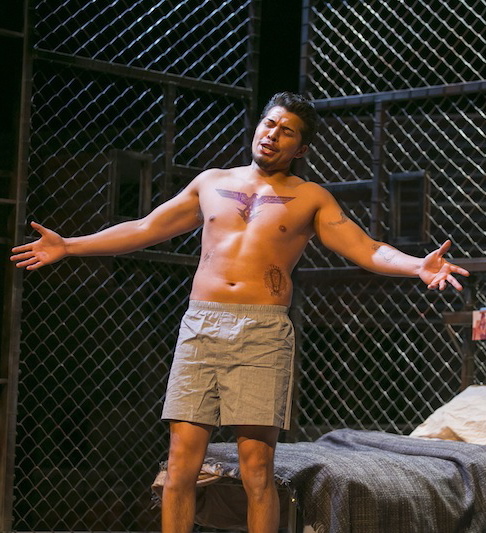Northwestern presents Heggie’s “Dead Man Walking” in riveting local premiere

Since its acclaimed debut in 2000 at San Francisco Opera, Jake Heggie’s Dead Man Walking has gone on to many well-received performances around the globe.
Disappointment that the powers that be at Lyric Opera have never seen fit to bring Heggie’s first opera to Chicago audiences over the past decade and a half was mingled with satisfaction that Northwestern University’s Bienen School of Music is providing that belated service—and doing so on an extraordinarily high level.
Indeed, the riveting performance of Dead Man Walking presented Sunday afternoon at Cahn Auditorium by Northwestern University Opera Theater was so well done and completely realized in every respect, that it’s hard to imagine either of Chicago’s two professional opera companies doing better.
Based upon the book of the same name by Sister Helen Prejean (and later made into a lauded movie starring Susan Sarandon and Sean Penn), Heggie’s opera tells the true story of the relationship between Sister Prejean and Joseph De Rocher, a Louisiana death row inmate convicted of a horrific rape and double murder. The lonely young nun becomes his spiritual advisor and eventually succeeds in establishing a relationship with the rough, unrepentant criminal who continues to deny his guilt. With all appeals exhausted, under Helen’s prodding, De Rocher finally breaks down and confesses his guilt before he is executed.
Like the book and movie is it based upon, Dead Man Walking is a clear statement against capital punishment with the chilling final scene showing De Rocher’s execution by lethal injection in clinical detail.
Yet Terrence McNally’s sophisticated yet vernacular libretto is neither preachy nor didactic and conveys an affecting, all-embracing humanity. The crime is graphically depicted in the opera’s opening minutes—immediately contrasted with the sunny innocence of children singing a hymn with the nuns. None of the principal characters are caricatures—though the fatuous prison chaplain comes close—and the grieving parents of the murdered teens have their say as well as De Rocher and his mother. The parents confront Sister Helen as to why she has become De Rocher’s friend and spiritual advisor yet she has never met with them or tried to comfort them. Helen can only stammer, “I’m sorry, I’m sorry.”
While not equaling the majestic musical depth or expressive range of his masterwork Moby Dick, Heggie’s intimate opera is an extraordinarily mature first effort. The composer mines populist modes where appropriate–gospel and hymns for the nuns and even bit of rock and roll when Sister Helen and De Rocher connect through being Elvis fans. Heggie’s style is predominantly tonal and lyrical yet never saccharine, scored with great skill and an insistent contrapuntal thrust. There is an aggressive urgency and jabbing rhythmic syncopation in the dramatic moments, and the big ensemble that ends Act I shows real compositional mastery.
William Boles’ scenic design was visually striking and effective with its bilevel prison, irregular hanging metal fences and barred walls, the fast-moving scenes fluently directed by Michael M. Ehrman. Conductor Michael Sakir led the large forces of the Northwestern University Symphony Orchestra with impressive skill, bringing out the intimate lyrical moments while providing daunting force and power to Heggie’s percussion-led climaxes.
Northwestern is presenting Dead Man Walking with two alternating casts of principals. Sunday’s matinee was dominated by the remarkable performance of Ethan Simpson as De Rocher. The young baritone wholly embodied the rough convict, singing with a strong voice and bringing searing dramatic intensity to the role, building to an emotionally devastating account of the guilty convict’s confession to Sister Helen. Ethan Simpson is clearly a gifted artist we will be hearing more from.
In the less flashy but pivotal role of Sister Helen, Kelsey Ankerson Park was assured as the prim yet socially committed nun. Park’s mezzo-soprano is somewhat unvaried in color, yet Park put across the power where necessary and was always dramatically credible.
The large supporting cast was filled out with several fine turns. Emily Barnash sang with luminous soprano tone and affecting sensitivity as De Rocher’s mother. Ted Pickell displayed a deep bass as George Benton, the sympathetic warden, and Donovan Ott-Bales showed a big, hearty tenor as the dubious chaplain, Father Grenville. Joelle Lamarre offered a powerful soprano as Helen’s friend and colleague, Sister Rose. Nathaniel Hill brought a rounded dimension to Owen Hart, father of the murdered girl, with equally worthy singing by the other grieving parents (Madison Leonard, Alexandria Urquiola, and Nathan Ward). Donald Nally drew superb, well-blended singing from the children’s ensemble and men’s chorus of inmates.
There are only two more performances of this important American opera, and this is not a show to miss. Kudos to Northwestern University for bringing this overdue premiere to Chicago audiences.
Dead Man Walking will be repeated 7:30 p.m. Thursday and Saturday at Cahn Auditorium in Evanston. pickstaiger.org
Posted in Performances



Posted Feb 23, 2015 at 6:47 pm by Frederica S.
This is a wonderful production. The lead cast on Friday Feb. 20 was equally riveting!